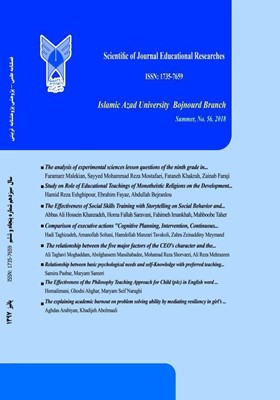The analysis of experimental sciences lesson questions of the ninth grade in Kermanshah Province andi nvestigate the alignment of them in terms of Anderson and Krathwohl’s taxonomy
Subject Areas : Educational ScienceFaramarz Malekyan 1 , Sayyed Mohammad Reza Mostafaei 2 * , Fataneh Khakrah 3 , Zainab Faraji 4
1 - Faculty of Literature and Humanities, Kermanshah Branch, Islamic Azad University, Kermanshah, Iran.
2 - Department of Educational Administration, Faculty of Literature and Humanities, Kermanshah Branch, Islamic Azad University, Kermanshah, Iran.
3 - Department of Educational Administration, Faculty of Literature and Humanities, Kermanshah Branch, Islamic Azad University, Kermanshah, Iran.
4 - Department of Educational Administration, Faculty of Literature and Humanities, Kermanshah Branch, Islamic Azad University, Kermanshah, Iran.
Keywords: Psychometric properties, Experimental Sciences, Question analysis, Anderson and Krathwohl’s cognetive taxonoy,
Abstract :
The purpose of this study was the analysis of psychometric properties and the levels of cognitive domain of final exam questions of experimental sciences lesson of the ninth grade of Kermanshah Province in June 2016 based on Anderson and Krathwohl’s educational objectives. The research was applied in terms of objective, as descriptive research and was evaluation. The statistic population included all of the examination papers of experimental sciences lesson of the ninth grade in boy’s junior high school of district one in Kermanshah which were 2007 papers, among whom 323 papers were selected as the sample through relative cluster random sampling. Measuring tools included difficulty coefficient, discrimination coefficient, Lawshe content validity ratio, Kuder-Richardson reliability coefficients, Cronbach’s alpha coefficient and the check list of Anderson and Krathwohl’s cognetive objectives. The results showed that the questions had been contained appropriate difficulty coefficient and high discrimination coefficient. The validity coefficients of all questions and reliability coefficients of objective questions were low, but reliability was high for non- objective questions. In accordance questions with dimensions of cognitive domain and Anderson and Krathwohl’s taxonomy of educational objectives, more questions were in knowledge level and knowledge of real-life (facts) level and any questions was designed on the basis of cognitive domain of evaluation and creative and metacognitive knowledge.
_||_

